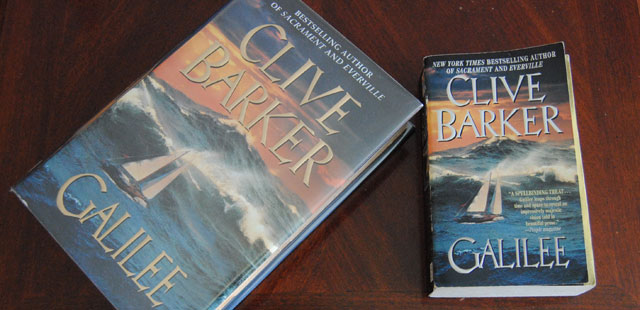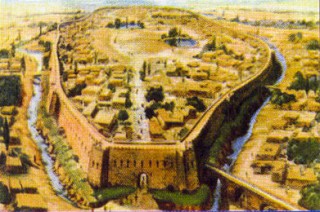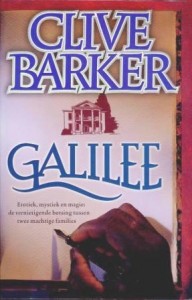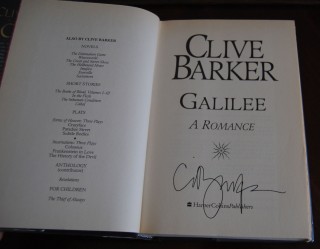
Galilee by Clive Barker is a departure from what most people know of his work; horror. This is a fantastical book. It’s a book about a book, a story about a story. The book is about Maddox putting to paper the histories of his family, the Barbarossas. But to do that he must also tell the story of the Gearys and the title character, Galilee, is the thread that binds these two families together.
Maddox takes us from the present to the past and back again many times, and the book reads like watching a movie with the director’s commentary track on. He does this in L’Enfant, which is no ordinary house. Of the many romances either detailed or mentioned within the story, the romance that birthed L’Enfant, the house in which he lives, was between Maddox’s stepmother, Galilee’s mother Cesaria Barbarossa, and Thomas Jefferson. Jefferson built L’Enfant for Cesaria at the same time he built his own home, Monticello.
The story of the Barbarossas and the Gearys isn’t just about lining up all of the characters and events because, in the current time period in which he is writing, a war is brewing between the two families. We begin to understand that conflict and how Galilee and the others fit in as the text moves along. But I’m doing both families an injustice by calling them mere families. These are two vastly differing dynasties that both embody the word perfectly.
What is the meat of it? Maddox muses at once point when having a conversation with his half sister Marietta that he’d love to know a book by heart and tell it as the storytellers of old practiced their craft for food, wine, and bed. He describes a conversation he would have with a would-be listener by saying, “You don’t like what I’m telling you, sir? Don’t worry. It’ll change in two minutes. You don’t like scandal? I’ll tell you something about God. You hate God? I’ll recite you a love scene. You’re a puritan? Have patience; the lovers will suffer. Lovers always suffer.”
The book contains all of those things and more; of divinities and humans, love and violence, life and death, destitution and decadence. The insights into the wealthy family of the Gearys and their scandalous past and the intrigue of the Barbarossas, a family of divinities and their excesses, is beyond compare. On the story he’s writing, Maddox states, “They all have their poetry: the glittering cities and the ruined, the watery wastes and the dusty; I want to show you them all. I want to show you everything.”
More to the point, and to quote Maddox again, “There’s more to tell of this matter, of course; but some stars take longer to show themselves than others. The paradox is this: that the darker it gets, the more of these secrets we can see. Eventually, they’re arrayed in all their glory; and it’s the very things we hid from sight, the things we’re most ashamed of, that we use to steer our course.” This of course, applies to every part of the story.
Is this just a family history, Mr. Maddox? No, “I’m making something entirely different. It’ll be a ragtag thing, no question, sewn together in its way as a small, nicely formed tale. And by the way, more life like.”
There are quite a few players in this nine-act play; Maddox, Marrieta, Cesaria, Luman, Zabrina, Zelim, Nicodemus, Cadmus, George, Mitchell, Margie, Loretta, Rachel and, of course, Galilee, to name a few.
I must admit that this is quite possibly my favorite book of all time. It has such depth and detail that it’s as good the second and third time you read it as it is the first, and you always come away from a reading with something new.
I am convinced there isn’t another book like it out there, or at least I haven’t found another that is so broad in scope and yet doesn’t wander or dilute itself. Part of this could be attributed to the way this book is written, with a constant commentary from the author himself, who at times is convinced the book will be his end, while at others believes the book is his salvation.
In the end, Maddox’s running commentary takes us to a particularly poignant thought: “…I have been moved and changed by the journey I’ve taken, and I don’t look forward to its being over, as I thought I would. In truth, I’m a little afraid of being finished. Afraid that when I get to the end and set my pen down, I will have spilled so much of myself onto the page that what remains inside me, to fill the vessel of my being, will be inadequate. That I’ll be empty, or nearly so.” But there is no worry. What Maddox puts on the page is enough for many generations to mull over.
Clive Barker’s Galilee is a masterpiece of the written word. It was published in 1998 and I’ve read it many times and I’m sure I’ll read it again. This is not the only non-horror that Barker has written, but it is quite possibly one of the best. If you haven’t read it, I think you should. If you have read it, do it again, because it will astonish you as much this time as it did the first.
Barker’s characters give us brilliant glimpses into the human condition, among many other conditions. Some of those glimpses are:
“I daresay most of us live in such pitiful realms. It takes something profound to transform us; to open our eyes to our own glorious diversity.” – Maddox
“Nothing happens carelessly. We’re not brought into the world without reason, even though we may never understand that reason.” – Maddox
“It’s not always possible to stay where you belong.” – Galilee
“That attempting to understand the big picture was to partake of a peculiarly male delusion: the belief that events could be shaped and dictated, forced to reflect the will of an individual.” – Rachel
“This world was like a labyrinth; it was easy to get lost in, to become a stranger to yourself.” – Rachel
“You can’t go through life worrying about what the echoes of the echoes of the echoes of your deeds will be; you have to do what you can with the moment, and let others take care of their moment when it comes.” – Maddox
I do have one thing to impart. To anyone who may say, “If it’s so good, why don’t they make a movie of it?”, I sincerely hope they don’t. Of course, if they did I would see it, but I don’t think even an extended two-hour plus theatrical release could do justice to such a masterpiece.
I do believe in my heart of hearts that it is that good. Of course, I am a little biased. I like it so much I have two copies – the hardcover book signed by the author himself and a paperback version. Even though the full title is Galilee: A Romance, I believe classifying this as a romance would be a disservice. It is so much more than a simply romance.
Don’t believe me? Buy it and see for yourself.
Read the Secret File of technical information and quotes from Galilee by Clive Barker.




